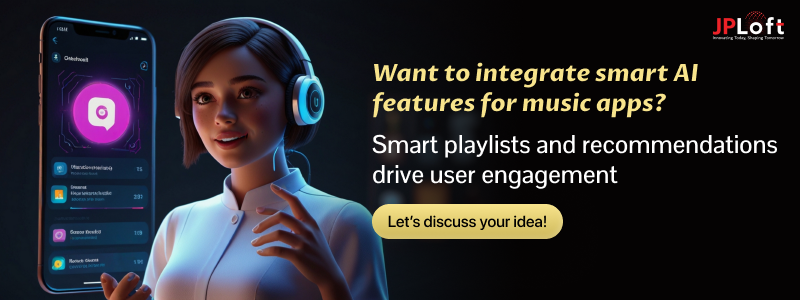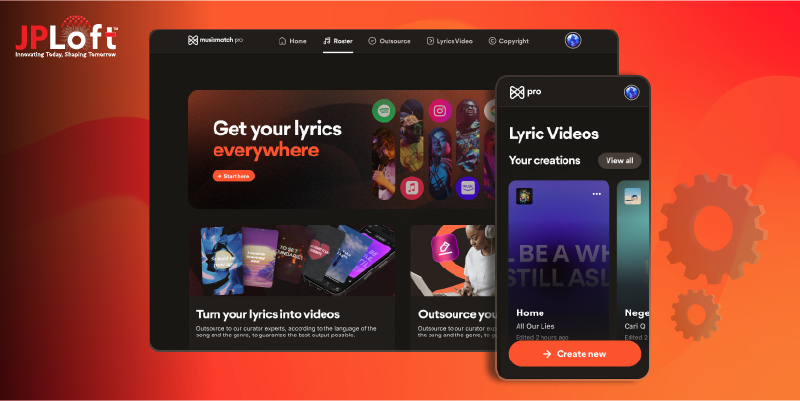Key Takeaways
AI features for music streaming apps AI-powered recommendations, mood-based playlists, and smart search create highly tailored listening experiences.
Predictive analytics, adaptive streaming, and real-time insights help reduce churn and keep users loyal.
Smarter Discovery & Curation like AI auto-curated playlists, cross-platform personalization, and music tagging make exploration seamless and intuitive.
AI-generated music, AR/VR concerts, and hyper-personalized experiences are shaping the future of music streaming.
As a leading music streaming app development company, JPLoft builds AI-powered apps with personalization and future-ready features to help your platform stand out.
Music streaming has revolutionized the way we experience sound, and artificial intelligence in music apps is now at the forefront of this transformation.
According to Statista, the global music streaming market is projected to surpass $80 billion by 2030, with AI-driven personalization being one of the biggest growth drivers.
Modern platforms leverage top music apps with interactive features to deliver highly personalized and engaging experiences, making every listener feel understood. The AI features don’t just cater to user preferences; they also enhance engagement, retention, and overall satisfaction.
So, in this blog, we are going to discuss the best AI features for music streaming apps, explore how they enhance user experience, and uncover future trends shaping the next generation of music platforms.
How AI is Transforming Music Streaming Apps?
How AI is changing music streaming is not just a trend; it’s a revolution that promises a personalized music experience with AI for every listener.
Artificial intelligence plays a central role in transforming music streaming from a simple playback service into an interactive, adaptive platform.
Partnering with an experienced AI app development company can help businesses harness these innovations to build smarter, more engaging, and future-ready music apps.
Let’s take a glance on how AI is transforming this industry.
A] Personalization at Its Core
AI enables personalized music recommendations that consider listening habits, favorite genres, and even the time of day to suggest tracks users are likely to enjoy.
Platforms like Spotify and YouTube Music use machine learning in music apps to analyze large datasets, predicting which songs will resonate with each user. This level of personalization is no longer optional, it’s a necessity for maintaining user engagement.
B] Enhanced User Engagement
Through AI-driven playlists and recommendations, users are introduced to new music tailored specifically for them. AI music streaming app features such as mood-based playlists, genre-curated recommendations, and automated radio stations keep listeners returning to the app.
The result? Higher engagement, longer session times, and stronger user loyalty.
C] Business Benefits
AI doesn’t just help users, it also aids businesses. By leveraging AI, you can track user behavior to identify trends, predict churn, and refine marketing strategies.
The role of AI in the music industry extends beyond recommendations; it’s a tool for creating smarter apps that anticipate user needs and maximize revenue potential.
In short, AI has become the backbone of modern music streaming apps, delivering personalization, boosting engagement, and driving business growth.
As technology advances, the role of AI in shaping the future of music consumption will only get bigger, making it an essential investment for platforms aiming to stay ahead.
Top 20 AI Features for Music Streaming Apps
The success of modern music platforms lies in leveraging AI features for music streaming apps effectively. Artificial intelligence has moved beyond a supporting role to become the backbone of music discovery, personalization, and engagement.
From delivering AI music streaming app features to generating predictive insights, AI ensures that listeners get a highly personalized and seamless experience while helping platforms optimize their services.
Here’s a deep dive into the top music app features that are redefining the music streaming landscape:
1. Personalized Music Recommendations
At the heart of features for the AI music app is personalized music recommendations. By analyzing a user’s listening history, liked tracks, skipped songs, and engagement patterns, AI can suggest songs tailored to each individual.
Platforms like Spotify’s Discover Weekly or YouTube Music’s Home recommendations provide listeners with tracks they might not have discovered otherwise.
This personalized music experience with AI features for music streaming apps not only enhances user satisfaction but also increases engagement, encouraging listeners to spend more time on the platform.
2. AI-Powered Playlists & Auto-Curation
AI enables apps to automatically generate playlists that fit a user’s mood, activity, or genre preference. Whether it’s a workout playlist, study mix, or relaxing evening tunes, AI-driven playlists and recommendations ensure users always have fresh and relevant content.
Platforms like Pandora and Apple Music dynamically adjust playlists based on user interactions, creating a continuous sense of discovery. Artificial Intelligence features for music streaming apps fosters loyalty and keeps listeners connected to the app.
For developers looking to create an AI app, integrating automatic playlist curation is a key strategy to deliver a personalized music experience that keeps users engaged and coming back for more.
3. Smart Search & Voice Recognition
Finding the right track has never been easier thanks to smart search in music streaming apps. AI can process partial lyrics, voice commands, humming, or even descriptive searches like “upbeat songs for jogging.”
By leveraging artificial intelligence in music apps combined with Natural Language Processing (NLP), platforms like YouTube Music and Amazon Music offer fast, intuitive, and accurate search results.
Businesses looking to implement similar AI music streaming app features can partner with experts offering NLP development services to create advanced voice and text-based search functionalities. This reduces friction and enhances user satisfaction.
4. Audio Analysis & Music Tagging
AI can analyze songs to detect attributes such as tempo, genre, mood, key, and instrumentation. Using machine learning (ML) in music apps and professional ML development services, platforms can efficiently tag and categorize massive music libraries.
This improves AI-driven playlists and recommendations, enabling accurate matches between tracks and user preferences.
Spotify, for example, uses audio fingerprinting and analysis to curate Discover Weekly playlists with precision, proving how AI can enhance personalization at scale.
5. Predictive Analytics for Retention
Retention is critical for streaming platforms, and predictive analytics help identify users who may be at risk of churn.
By analyzing listening patterns, skip rates, session duration, and engagement, AI can alert the platform to intervene with personalized notifications, playlist suggestions, or reminders.
This ensures users remain engaged and fosters long-term loyalty. With features for the AI music app, businesses can take a proactive approach to user retention, using real-time insights to reduce churn and build stronger connections with their audience.
6. Adaptive Streaming Quality
AI features for music streaming apps can dynamically optimize streaming quality based on network speed, device type, and user preferences. This ensures uninterrupted playback even under poor network conditions, enhancing the overall experience.
Adaptive streaming is especially important for users in regions with inconsistent internet connectivity, and it helps platforms maintain a seamless music experience with AI.
By automatically adjusting bitrates and buffering intelligently, AI not only reduces frustration but also improves overall user satisfaction, making the app more reliable across diverse environments.
7. AI-Driven Content Moderation & Copyright Protection
AI helps platforms detect pirated content, inappropriate uploads, or spam. By automatically scanning user-generated content, AI ensures library integrity while protecting intellectual property.
This demonstrates the role of AI in the music industry beyond personalization, safeguarding content, and ensuring compliance with copyright regulations. In addition, advanced Artificial intelligence for music apps can flag suspicious activity in real time, reducing the risk of legal disputes and maintaining platform credibility.
If you are planning to build AI-powered platforms, you can hire dedicated developers to integrate such content moderation AI music streaming app features effectively and stay compliant with industry standards.
8. Real-Time Analytics & Insights
Artificial intelligence provides real-time insights into listener behavior, trending songs, and regional preferences. Platforms can use this data to optimize playlists, create targeted campaigns, and develop predictive features.
Real-time analytics allows companies to stay ahead of trends and make data-driven decisions that enhance user engagement.
9. Mood & Context-Based Recommendations
Modern music apps use AI to detect the context in which users listen, whether it’s exercising, studying, commuting, or relaxing. Mood-based playlists and context-aware recommendations create highly personalized top music apps with interactive features.
It ensures that users hear the right music at the right time. This deepens engagement and fosters a stronger emotional connection to the platform.
10. AI-Powered Music Discovery
AI makes discovering new tracks effortless. By analyzing user tastes and global listening trends, platforms like Spotify, YouTube Music, and Mixcloud help users explore beyond their preferred genres.
AI-driven music discovery keeps the library fresh and ensures listeners continually engage with the platform. Moreover, Artificial Intelligence features for music streaming apps introduces users to artists they may have never encountered, broadening their horizons.
It also helps upcoming musicians gain visibility, showcasing the benefits of AI in music streaming apps for both creators and listeners.
11. Cross-Platform Personalization
Consistency across devices is a key factor in user satisfaction. AI ensures that whether a user listens via smartphone, tablet, web, or smart speaker, their preferences, playlists, and recommendations remain synced.
This cross-platform personalization strengthens loyalty and provides a seamless music experience. It also allows users to resume exactly where they left off, regardless of device.
By creating a truly connected ecosystem, platforms highlight features for the AI music app into a unified journey across technologies.
12. Playlist Sequencing & Smart Ordering
AI can dynamically reorder tracks in a playlist to maintain engagement or match the desired energy level. For example, a workout playlist might start with slower tracks and gradually build intensity.
This smart ordering ensures users remain engaged, enhancing the overall listening experience and highlighting top music apps with interactive features.This ensures that playlists feel alive, personalized, and constantly evolving with user behavior.
With the rise of AR/VR in music apps, playlist sequencing could even sync with immersive environments, creating experiences where music matches not only moods but also virtual spaces and activities.
13. AI Music Generation
Some platforms are exploring AI-generated music, where algorithms create new tracks or remix existing ones. This futuristic approach offers unique content and personalization, making platforms more engaging and innovative.
AI music generation is a glimpse into the future of AI in music streaming and opens opportunities for apps to stand out in the competitive market. Not only does this expand creative possibilities, but it also enables niche experiences such as meditation sounds, study music, or background scores.
This showcases the role of AI in the music industry as a tool for innovation, not just curation.
14. Social & Collaborative Recommendations
AI can analyze trends among friends or global communities to provide socially aware music suggestions. Collaborative playlists, shared recommendations, and community-curated mixes increase engagement and make users feel part of a broader listening community.
This creates a sense of connection and belonging that boosts long-term loyalty.
By combining personalization with social interaction, AI transforms music streaming into both an individual and collective experience.
15. Predictive Skip & Replay Analytics
By monitoring which songs are skipped or replayed, AI can refine recommendations for each user. This predictive analysis helps platforms avoid irrelevant suggestions, ensuring a smoother listening experience and higher user satisfaction.
Over time, the system learns user habits, such as favorite artists or disliked genres and fine-tunes playlists accordingly.
This feature highlights how AI in music apps continuously improves by adapting to real behavior.
16. Visual & Lyric Recognition
AI can recognize lyrics in videos or match them with tracks for faster discovery. Some platforms even allow users to hum or sing a portion of a song, and AI identifies the track instantly.
This improves discoverability and enhances the user experience across multiple devices. It also bridges the gap between video, audio, and text-based discovery, making music apps more versatile.
With smart search in music streaming apps, users can enjoy instant results without frustration.
17. Voice & Gesture Control Integration
AI-powered voice assistants and gesture controls allow hands-free navigation. Platforms like Amazon Music and Apple Music integrate these features to make music discovery and playback more intuitive, especially in smart homes and mobile contexts.
This feature is particularly valuable while driving, working out, or cooking, where hands-free access is essential.
Such innovations showcase the future of AI features in music apps by blending convenience with cutting-edge technology.
18. Dynamic Radio Stations
AI enables platforms to generate personalized radio stations that evolve in real-time based on user behavior.
These stations adapt to changing tastes, listening patterns, and contextual cues, creating a highly engaging, ever-changing experience for the listener. Dynamic radio stations also introduce lesser-known artists, offering a balance of familiarity and discovery.
To further enhance engagement, many platforms are beginning to integrate gamification in music apps, rewarding users for exploring new tracks, completing challenges, or engaging with AI-curated stations.
19. Contextual Ads & Monetization
AI allows personalized advertising by analyzing user preferences and engagement patterns. Ads are more relevant, less intrusive, and help platforms generate revenue without compromising the listening experience.
This is a practical example of how AI extends beyond personalization to monetization. For businesses, this ensures maximum return on ad spend (ROAS).
For users, it feels like an extension of their music journey rather than an interruption, showing the benefits for both sides.
20. Sentiment & Feedback Analysis
AI can analyze reviews, ratings, and social media interactions to understand user sentiment. Platforms can use this feedback to improve app features, interface design, and recommendation algorithms.
Continuous learning from user sentiment ensures that the app evolves to meet user expectations. By integrating this feedback loop, platforms not only boost satisfaction but also strengthen their brand image in the competitive music industry.
For businesses planning to create an app with AI features, sentiment and feedback analysis is crucial to ensure long-term user loyalty and continuous improvement.
The rise of top AI features in music apps is reshaping how users discover, engage, and connect with music on a deeply personal level. From personalized playlists to predictive analytics and real-time insights, these innovations are setting new benchmarks for seamless user experiences and long-term loyalty.
If you’re planning to build a next-gen streaming platform, partnering with an experienced mobile app development company in Denver can help you integrate these AI features effectively. With the right expertise, you can deliver smarter, more engaging, and future-ready music streaming solutions.
Future of AI in Music Streaming Apps
The future of AI in music streaming is full of innovation and possibilities. AI music streaming app examples already show how platforms are experimenting with AI-generated tracks, immersive AR/VR experiences, and hyper-personalized recommendations.
As technology advances, machine learning in music apps will power features that feel more natural, adaptive, and user-centric than ever before.
Here are some key music streaming app trends shaping the future of AI in music streaming:
-
AI-Generated Music Content: Algorithms are evolving to compose original tracks or remix existing ones, opening up endless possibilities for unique music experiences and personalized content libraries.
-
Immersive AR/VR in Music Apps: With AR/VR integration, listeners could attend virtual concerts, explore immersive soundscapes, or enjoy playlists designed for virtual environments, blending entertainment with technology.
-
Hyper-Personalized Experiences: From mood detection through wearable devices to context-aware playlists, AI will deliver personalized music experiences with AI that adapt in real time to lifestyle, location, or even biometric data.
-
Predictive Insights & Advanced Analytics: Future platforms will not only recommend songs but also predict what listeners might enjoy days or weeks ahead, ensuring long-term engagement through proactive personalization.
-
Smarter AI-Driven Playlists & Recommendations: The line between human curation and AI automation will blur as AI becomes capable of mimicking human creativity, offering playlists that feel handcrafted while being machine-generated.
Clearly, AI is changing music streaming will define the next decade of music consumption, inspiring new music app ideas and making platforms smarter, more immersive, and more responsive to listener needs.
Best Music Streaming Apps & How They Are Using AI
Artificial intelligence allows apps to offer highly personalized experiences, smart search, mood-based playlists, and predictive recommendations.
Whether it’s creating dynamic playlists or analyzing user behavior, AI is at the core of their success. Let’s discuss some of the best music streaming apps that are rocking in this industry.
► Spotify
Spotify is one of the pioneers in using music recommendations. Features like Discover Weekly, Release Radar, and Daily Mixes use machine learning in music apps to track listening habits, skipped tracks, and playlist preferences.
By analyzing millions of user interactions, Spotify predicts which songs will resonate with each listener, creating a personalized music experience with AI. If you’re planning to create an app like Spotify, integrating such AI-driven personalization features can help deliver a similar engaging user experience.
The result is one of the most engaging and addictive music streaming platforms globally, making it a top example for anyone looking to create best Spotify alternatives.
► YouTube Music
YouTube Music excels in smart search in music streaming apps. Users can find songs through lyrics, video snippets, or even humming a tune. Its AI analyzes viewing and listening history to deliver personalized music experiences with AI across multiple devices.
With predictive recommendations and context-based playlists, YouTube Music demonstrates how AI can merge video and audio content for a richer user experience.
Additionally, its AI-powered algorithm adapts to changing user preferences over time, ensuring that each recommendation feels fresh and relevant.
► Amazon Music
Amazon Music leverages personalized music recommendations and predictive analytics to offer curated playlists and personalized radio stations.
Machine learning helps identify patterns in listening behavior, ensuring the app provides content aligned with user preferences.
Features such as Alexa voice integration showcase the power of smart search in music streaming apps, enabling hands-free navigation.
For entrepreneurs, Amazon Music serves as an inspiration to develop an app like Amazon Music that balances personalization and convenience.
► Mixcloud
For those looking to develop an app like Mixcloud, Mixcloud focuses on DJ mixes, podcasts, and radio shows. Its AI algorithms recommend content based on user engagement, favorite genres, and listening history.
By analyzing complex audio patterns and user interactions, Mixcloud ensures a personalized music experience with AI that feels both curated and relevant.
Its combination of niche content and AI-powered discovery provides valuable insights for developers aiming to create a platform that attracts loyal users.
► eSound Music
eSound Music uses AI-driven playlists and recommendations to provide free music streaming and offline playback options. Its AI identifies listener preferences to generate custom playlists and suggest new tracks, offering a seamless user experience.
Aspiring developers can reference eSound when planning to develop an app like eSound, integrating AI features that appeal to global audiences.
Additionally, eSound leverages AI to analyze trending tracks and user engagement metrics, ensuring that content remains relevant and keeps listeners coming back.
These platforms illustrate top AI features in music apps, showing how AI is changing music streaming for users and the industry alike.
By adopting similar strategies, businesses can create apps that are highly engaging, personalized, and future-ready.
How Can JPLoft Help to Create an AI Music App?
Developing a music app with AI features for music streaming apps requires expertise in both music technology and AI. JPLoft, a leading music streaming app development company, specializes in creating AI-powered music apps that deliver personalized music experiences with AI.
Our team can integrate personalized music recommendations, smart search in music streaming apps, and machine learning in music apps to ensure your platform is competitive, scalable, and user-friendly.
From concept to deployment, we ensure that your music app leverages the best AI features for music streaming apps for maximum engagement and retention. In addition, we provide ongoing support and optimization to adapt to evolving user behavior and industry trends.
By partnering with us, businesses gain a platform that not only meets current expectations but is also future-ready, incorporating the latest AI innovations in music streaming.
With JPLoft, your music app can stand out in a crowded market and offer an unmatched user experience.
Final Wrap-Up
AI features for music streaming apps are no longer optional, they’re essential for enhancing user engagement, personalization, and retention. Platforms leveraging artificial intelligence in music apps provide dynamic playlists, personalized music recommendations, and predictive insights that revolutionize the listening experience.
By understanding the role of AI in the music industry, businesses can stay ahead of the competition while delivering a personalized music experience with AI.
The adoption of AI also enables platforms to optimize content delivery, improve user satisfaction, and explore innovative features like mood-based playlists and AI-generated tracks.
Clearly, how AI is changing music streaming is a glimpse into the future of entertainment, where every listener enjoys a smarter, more intuitive, and highly engaging music experience.
FAQs
The top AI features include personalized recommendations, AI-powered playlists, smart search, audio analysis, predictive analytics, and adaptive streaming quality.
AI analyzes user behavior, listening habits, and song attributes to deliver personalized playlists and suggestions, enhancing engagement and satisfaction.
The future involves AI-generated music, AR/VR integration, hyper-personalization, and predictive analytics to deliver seamless and innovative music experiences.
Partner with a specialised app development company that specializes in AI integration, machine learning, and personalized music experiences to build a competitive platform.
They increase user engagement, retention, and satisfaction by delivering personalized music experiences with AI, predictive playlists, and intelligent search capabilities.













Share this blog